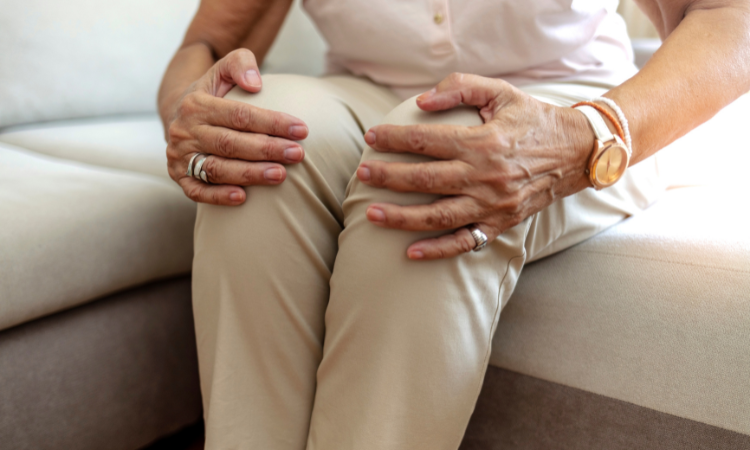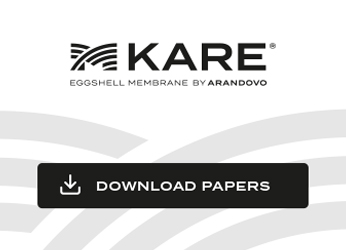Osteoarthritis is one of the most common diseases affecting millions of people worldwide, especially as we age. This chronic condition can affect the quality of life of those who suffer from it, causing pain and limiting mobility in the joints. However, with the right treatment and some lifestyle changes, it is possible to control its symptoms and significantly improve the quality of life.
Find out in this post by Arandovo what osteoarthritis is, what its most common symptoms are, and what treatment options are available to help relieve pain and improve mobility.

What is osteoarthritis?
Osteoarthritis is a degenerative joint disease characterized by the wear and tear of articular cartilage, a tissue that acts as a cushion between bones. As cartilage deteriorates, the bones begin to rub against each other, resulting in pain, swelling, and loss of mobility in the affected joint.
Osteoarthritis is the most common form of arthritis, and is primarily associated with aging. However, elderly are not the only ones at risk; factors such as being overweight, previous joint injuries, and genetics can also contribute to the development of this disease.
Types of de osteoarthritis
Osteoarthritis can affect any joint in the body, but there are certain areas more prone to developing it. Hereinafter we’ll explore the most common types of osteoarthritis:
Knee osteoarthritis
Knee osteoarthritis is one of the most common and debilitating forms of this disease. The knee, being one of the largest and most complex joints in the body, bears a great deal of weight and movement, making it susceptible to cartilage wear and tear.
Common symptoms include pain when walking, climbing stairs or even at rest. Over time, mobility is severely impaired, which can lead to a significant decrease in the quality of life.
Hand osteoarthritis
Hand osteoarthritis mainly affects the joints of the fingers and base of the thumb. It is more common in women, especially after menopause.
Symptoms include pain, stiffness, swelling and the formation of bony nodules that can deform the fingers. This type of osteoarthritis can make it difficult to perform everyday tasks such as writing, opening jars or handling small objects.
Hip osteoarthritis
Hip osteoarthritis is another common form of said disease that affects the hip joint, where the thighbone joins the pelvis. Pain in the hip may radiate towards the groin, thighs or even knees, making it difficult to walk, get up from a chair or bend over.
As the disease progresses, mobility becomes increasingly limited, affecting the ability to perform daily activities.
Osteoarthritis symptoms
Symptoms of osteoarthritis can vary in intensity and may develop gradually over time. The most common include:
Joint pain
Pain is the most prominent symptom and generally worsens with physical activity. In turn, it improves with rest, although pain may be present even at rest (in advanced cases).
Stiffness
Joint stiffness, especially after periods of inactivity such as waking up in the morning, is another typical symptom of osteoarthritis.
Swelling
Affected joints may get swollen due to cartilage wear and tear, as well as synovial fluid accumulation.
Loss of flexibility
The ability to move the joint through its full range of motion may decrease, affecting overall mobility.
Clicking or crackling noises
It is common to hear or feel a clicking or crackling sound when the affected joint is moved, indicating that the bones are rubbing against each other.
Deformity
In advanced cases, the joint may become deformed due to loss of cartilage and the formation of osteophytes (bony growths).
Degenerative arthritis
Degenerative arthritis is the term used to describe the process of progressive deterioration involving articular cartilage. Over time, wear and tear of the cartilage leads to exposure of the underlying bone, resulting in direct contact between the bones. This not only causes severe pain, but can also lead to the formation of bone spurs and loss of joint function.
The degenerative process of osteoarthritis is irreversible, which means that the damaged cartilage does not regenerate on its own. However, there are treatments that can slow down the progression of said disease, alleviate symptoms and improve the quality of life.
Best treatments for osteoarthritis
Treatments for osteoarthritis generally focus on relieving symptoms and improving joint function. Here are some of the best treatment options for it:
Medicine
Analgesics and non-steroidal anti-inflammatory drugs (NSAIDs) are commonly used to relieve pain and reduce swelling. In some cases, stronger medications or corticosteroid injections into the affected joint may be prescribed.
Physical therapy
Specific exercises can help strengthen the muscles around the joint, improve flexibility and reduce pain. Physical therapy may also include manual therapy techniques and methods such as ultrasound or electrical stimulation.
Weight loss
In some cases where overweight is a contributing factor, weight loss can significantly relieve pressure on the joints, especially on the knees and hips.
Orthopedic devices
Splints, insoles or canes can help reduce stress on affected joints and improve mobility.
Alternative therapies
Some people find relief with therapies such as acupuncture, laser therapy, or the intake of natural supplements such as MKARE®️, which can help relieve pain considerably.
Surgery
In more severe cases where other treatments have not been effective, surgery may be an option. Surgical options include cartilage repair, joint fusion or total joint replacement with a prosthesis.
MKARE®️ can help you
To help improve the quality of life of people with osteoarthritis, Arandovo has developed MKARE®️, a 100% natural functional ingredient based on eggshell membrane.
MKARE®️ is a supplement with 100% native protein, rich in elastin, glucosamine, hyaluronic acid, chondroitin, collagen type I, V, X, and over 400 vitamins which help to improve the quality of your bones and joints.
With MKARE®️ you can not only improve the health of your cartilage and joints, but you also can prevent swelling, improve mobility, and reduce joint pain thanks to its regenerative effect.
Osteoarthritis is a complex and challenging disease, but with the right treatment, the support of experienced professionals and natural dietary supplements, it is possible to manage its symptoms and maintain a good quality of life.
Check out our website now and find out about all the properties of MKARE®️, as well as its applications. If you think you need more information regarding our functional ingredient or you have any doubts, feel free to get in touch with us and one of our specialists will help you in no time.




